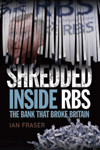
Shredded: Inside RBS, the Bank That Broke Britain
By Ian Fraser
Birlinn (£25)
(Buy at Amazon)
Financial crises are almost always the result of many different factors. However, there’s a natural desire to find someone to blame – and in the UK, Fred Goodwin, the former CEO of Royal Bank of Scotland (RBS), has probably attracted more blame than anyone else. Much of that opprobrium is deserved, given that he left us with a £45bn bill for bailing out RBS. Shredded: Inside RBS, the Bank That Broke Britain, by Ian Fraser, looks at what went wrong.
As you would expect, “Fraser does not stint on juicy detail about Fred’s behaviour”, writes Colin Donald in the Sunday Herald. Indeed, he recounts in detail Goodwin’s “relish for personal humiliation”, even ordering “senior suits to get down on their hands and knees and weed the car park”. However, Donald emphasises that the book “moves things on considerably”, by linking Goodwin’s eccentric personal behaviour to bad business decisions. Chief among these was the disastrous decision to take over ABN Amro, out of a desire to get back at the Dutch bank’s CEO.
However, while Donald notes approvingly that the author “spoke to 120 current and former RBS employees”, the FT’s Philip Augar is disappointed that Fraser didn’t interview the man himself. As a result, “we have the case for the prosecution but not for the defence”.
That said, as Bill Jamieson writes in The Scotsman, “Fraser wisely points out that Goodwin alone cannot be solely to blame”. Fraser also blames “the cowardice of the board of directors, the feckless oversight of regulators, politicians, rating agencies, so-called independent risk-assessment committees, analysts – and most of the financial press”. Indeed, “all the charges against them are set out in Fraser’s final, forensic, brutal and most powerful chapter”.
This leaves the question of “how is order to be secured and corporate culture changed for the better”?
All the reviews are extremely positive. Tom Harper calls it “explosive” in The Independent on Sunday. Augar calls it “a monumental book, well written, impeccably researched and hard to put down at any point”. Donald agrees that this “magisterial” book’s future will be “as a what-not-to-do textbook of management science”. He also thinks it would “make a cracking film, if toned down for the sake of realism”. Overall, the book “has a place on the top shelf of financial investigative journalism”.